Deus Ex: Mankind Divided Hands-on – Adam Jensen is getting more upgrades
After spending six hours with Deus Ex: Mankind Divided, I was able to develop a preliminary opinion about the new part of the classic series. The sequel is immersive, visually amazing, and manages to mend the shortcomings of Human Revolution.
My memories of the first Deus Ex are vague, the only vivid impressions being Liberty Island and the clumsy attempts of a ten-year-old kid – fascinated by the world created by Ion Storm – to complete the game. Many years later, when Deus Ex: Human Revolution hit the market, I gave it a go without a moment of hesitation, although it was probably due to nostalgia more than anything else. The game, while not without certain shortcomings and misguided solutions, was remembered fondly by many players, allowing Adam Jensen to return to the screens of our monitors this August. After spending six hours with Mankind Divided I'm pretty sure that the game’s protagonist asked for this.
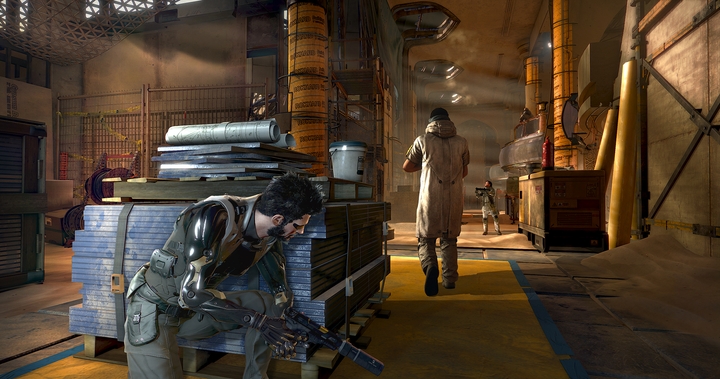
The basics: story and gameplay
Let’s start off with the sequel's plot. The events of Mankind Divided take place two years after the conclusion of Human Revolution; Adam Jensen has become a member of a special unit affiliated with Interpol – Task Force 29. At the same time the protagonist, together with a group called the Juggernaut Collective, is trying to unravel the secrets shrouding the Illuminati, the organization behind the events of the previous installment in the series. This means that Jensen is playing for both sides, and their agendas aren’t always aligned. What’s more, the events of the year 2027 have significantly boosted the radicalization of anti-aug purists, and those who already have such implants are very often locked up in ghettos or, at best, isolated in everyday social life. What I was able to see suggested complete social segregation in the game world – augs even had separate shopping queues and designated space on metro stations. The current life of our protagonist is far from being simple, it seems, and the events from the beginning of the first act in Prague clearly show what certain people are capable of... And who are those people? This we will find out once we get to the bottom of things.
From the very beginning of the game, I was wondering about the endings – which one of the four options will be considered as canon? The answer to this question was provided by Jean-Francois Dugas, the executive game director of Deus Ex: Mankind Divided:
Basically, the approach we took is that all the endings of the last game are canon in a sense. When you think about it, there are only three people who know what really happened: Eliza Cassan, Adam Jensen and the person with the controller who plays the game. Therefore, in the world of Mankind Divided there are rumors, there are beliefs and questions, there are people who think they know the truth – it’s all perverted (…) but ultimately nobody knows what happened. Apart from that, there are two years between the games, so probably Adam Jensen went though some things in the meantime.
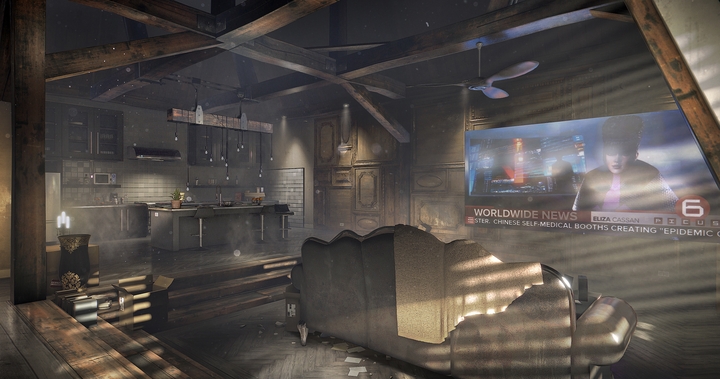
During the game, I was under the impression that the story has become much darker and more depressing. The world we play in is orchestrated by demagogues who play on people’s emotions to achieve their goals, and the radicalist moods had already managed to effectively divide the society. And although the latest part of the game employs the same premise of intrigue and mysterious Illuminati pulling the strings from behind curtains, this time we are given a story painted in completely different colors (and I mean something more than just the removal of the ubiquitous golden filter).
Some major changes have also taken place in the gameplay. While the game is still based on four main cornerstones – sneaking, shooting, hacking and interacting with different characters – the game went through remodelling and changes in the balance of the different approaches that allow us to complete the mission objectives. While in Human Revolution the most rewarding approach was to sneak through each level, the developers now give us the opportunity to achieve a similar level of character development regardless of our method.
Let’s say you play a mission, like Dubai. You finish the mission and you have roughly the same number of experience points whether you preferred stealth or combat. It’s just that with stealth you have to wait until you finish the mission to get your points, and in combat you get your points as you progress, only in smaller chunks. So it’s a different experience as you play, but in the end you should be rewarded almost equally.
Experience points and character development options are not everything that changed. Shooting and cover system have both been revised, making them more suited to today's standards, and rendering the game more fluid. Gunfire exchanges in Mankind Divided actually look like realistic fighting with firearms, and not some lousy water pistols. The controls were revamped as well, providing much more natural movements, and making the use of implants, both in combat and during exploration, much more intuitive. There’s also good news for all those who already got used to the way they controlled their characters in Revolution – at the start of the game you can choose identical control scheme as the one known from the prequel. I, for once, decided to try out the new controls, and I must admit that they are very clear and fit well with other changes.
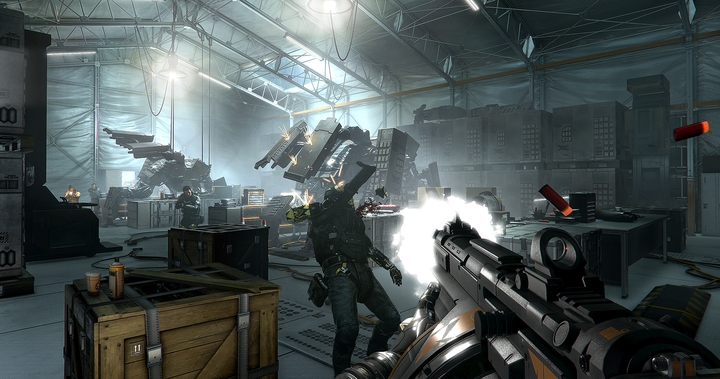
The biggest complaint against Human Revolution was the necessity to tackle boss fights in one particular way, an issue that was only repaired later on in the Director's Cut edition. This time the creators of the game will not force us to go in all guns blazing. The person I was sent after to Golem City was not too very happy about my presence, but I managed to out-talk and persuade them to return with me to Prague willingly. How it all ended, however, you will have to find out for yourselves.
All those changes don’t make the game any easier. With the new level design (strongly emphasizing verticality of locations) we also get more opportunities to use stealth, but it remains an attention- and caution-demanding activity. Shooting, although much improved, punishes us for engaging in combat without a tactical approach. Those thinking that the new Deus Ex will allow them to tear through a level just like that will be proven wrong in a rather painful manner. True, there are implants that boost Jensen's endurance and defenses, but they require the player to focus their character build on a specific style of gameplay. The new Deus Ex has lost none of its complexity, only improving on what was faulty in the gameplay of the previous installment.
The game also features a limited crafting system. By collecting various types of components in the game world, we can create such useful things as Biocells to restore our energy or Hypostims that restore our health.
As you probably know, Jensen's got some new toys (by which I mean augmentations, obviously) to play with. Their introduction is explained by the plot, but more important are the mechanics of their use. In addition to the usual set, our protagonist now has access to so-called "experimental augmentations," a technology branch not without certain consequences. Activating the development tree of one of those implants permanently raises Jensen's energy consumption, and to make up for it we must give up on other experimental implants. Such a system doesn’t allow us to unlock everything, but that's not exactly the point of RPG character development, is it? I had several opportunities during the game to try out the new gadgets, such as Tesla gun arm, which can immobilize up to four enemies, and I have to admit that they all make sense – you never get the irritating feeling that the new skills were included for the sake of novelty.
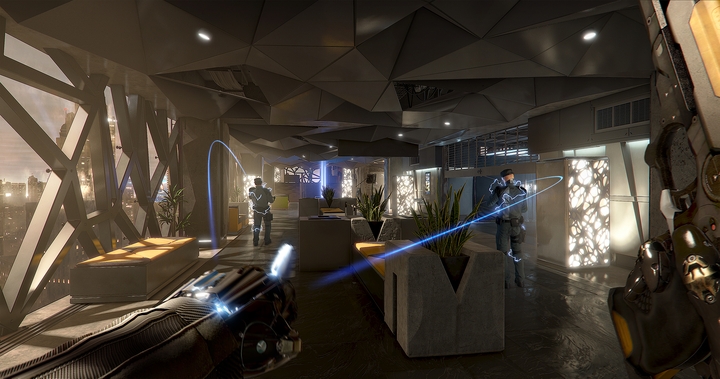
More and better?
All right, since we already know what’s new in Mankind Divided, it’s time to elaborate on the size of the game. So far, we’ve seen three major locations where the events will unfold: Dubai, serving as a prologue; Prague, the setting of the first act; and Golem, which is a kind of ghetto in the outskirts of the Czech capital where all the people with implants are herded. Apart from those three locations, we haven’t seen anything else in the current build, but there are some clues suggesting that the game will also take us to London. Dugas highghlited that some hints about the remaining locations can be found in the recent trailers of the game. Eagle-eyed fans – you know what to do.
Dugas couldn’t say exactly how long it will take to finish the game, but he mentioned that the fastest playthrough during so-called “play tests” took 18 hours, and it was practically a sprint through the game, without completing any side quests, reading notes, newspapers, etc. A typical playthrough on normal difficulty should take more than 20 hours, but the completionists can expect a much longer experience. What’s more, Mankind Divided introduces a new difficulty level called “I never asked for this” (oh, you…), which, aside from being, well… extremely difficult, also features permadeath – meaning that if Jensen dies, the whole game ends. Additionally, there will also be a Breach mode, but it’s only a side activity, completely unrelated to the main plot.
I couldn’t help asking for the structure of the game’s endings, and since the answer turned out to be pretty interesting – also in the context of the previous Deus Ex – I’d like to quote it unabridged:
When you get to the endings here, you’ll find out that they have nothing to do with the endings of Human Revolution. With the last game, the button thing at the end was not our original vision. Initially, we wanted for each of the choices to pose a challenge you would have to overcome to achieve whatever ending you wanted. Our goal with that was for you to think as you were going through the challenge, because it would have you rethink your choice: “Is this really what I believe in, what I want?”. So we wanted something more involving. But we were in the end of our production, we were running out of time, and we said at some point, “You know what? At this point in the game, the story is over. It’s not about Adam Jensen anymore. It’s not about this big conspiracy anymore. It’s about the player, about what the player thinks of all of this and what he or she believes that’s going to happen next”. And that’s why we scaled it down to four buttons and the short movies that were playing after that. It was all real footage and it was more like, when you look at our humanity evolve, do you believe that you’re going to succeed with the direction you want it to go. What you do during the game matters. In the last game it mattered as well, it’s just that it was really subtle. We were tracking, from the start to the finish of the game, all the actions you were doing. We had 3 variables: were you playing like a human, like an ambivalent character or more like a cyborg, a really cold guy. And depending on how you were playing, you were getting a rating and when you were getting to the end of the game, there was this narration of Jensen and it was tailored according to the values you got. So what you did during the game mattered, but it didn’t matter in an obvious way for the players. This time around it’s going to be much different, and yes, there will be things that you might stumble into during your quests that are going to really affect your ability to do some things in the final challenges.
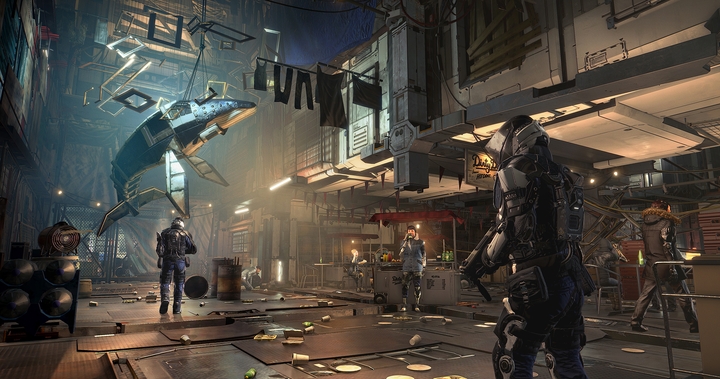
A huge leap in quality is also visible in terms of graphics. Apart from the obvious fact that a whole generation of technology separates Human Revolution and Mankind Divided, the Dawn Engine allows the creation of a much more realistic world. While in Human Revolution I sometimes felt that locations were just darkness painted gold here and there, in the new Deus Ex the diversity is clearly visible. The hotel in Dubai is sandy, Prague is gray and full of tension (also in how the location is depicted, not only in terms of dialogues), and Golem is gloomy, dangerous, and suffocating, giving the augmented vibe through gold elements. The verticality of the architecture offers the player much more options, and thanks to the new engine the interiors are much more detailed, significantly boosting immersion. Dugas emphasised that one of the team’s goals was to achieve narration through environment, not merely through words. The character models are miles ahead of the previous game. Lip-sync is certainly better, but there’s still much room for improvement in this aspect. The game looks wicked on PlayStation 4, but I can’t wait for the presentation of the PC port, because it looks that the engine can deliver much more.
Since we’re on the subject of PCs, let’s take a look at some technical stuff. Square Enix, once again, is cooperating with AMD, so we can expect such treats as TressFX 3.0. The game will support DirectX 12, but the developers haven’t forgotten about the owners of GPUs that don’t venture beyond DX 11. We can expect 4K support as well. The PC version will feature all the necessary elements of modern rendering: anti-aliasing, advanced shadows rendering, 60 frames per second, and adjustable field of view. The PC port will again be trusted to Nixxes, the team that has done a great job with Human Revolution.
Although I couldn’t see it with my own eyes, a VR demo has also been prepared. The game may not offer a full support of Virtual Reality, but the devs created something they call “Deus Ex VR Experience”. It is a set of four interiors taken straight from the game, which can be viewed through VR goggles. Andre Vu assured us that the level of detail in those rooms is identical with the full game, but the VR Experience presents us with an opportunity to thoroughly examine the locations, which would otherwise be difficult in a game where a lot is happening.
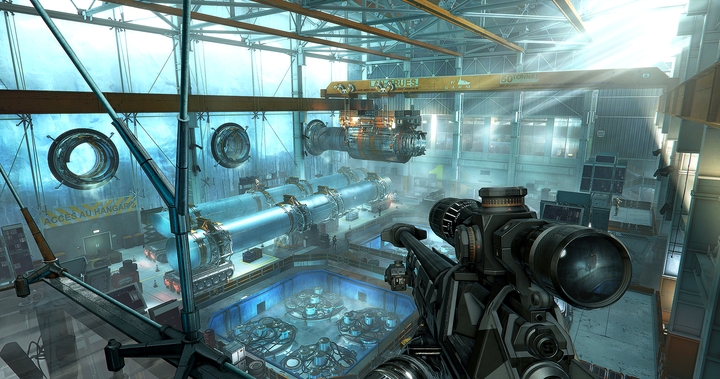
I had a lot of fun with Deus Ex: Mankind Divided. I like the direction taken by Eidos, and I appreciate the fact that they want to make a game that picks up where the previous title left off instead of forcing a totally unnecessary revolution. The story of Adam Jensen was supposed to have ended with the conclusion of Human Revolution, and his return is an answer to the demands of the community (but money has certainly played its part as well, there’s no denying here). We can only hope that the final build of the game, which will be available around the end of August, will iron out all the minor glitches that I’ve encountered during my play, and the story will be equally interesting and satisfying as the one we got to know five years ago. After six hours spent with this game I am certain I want more.
